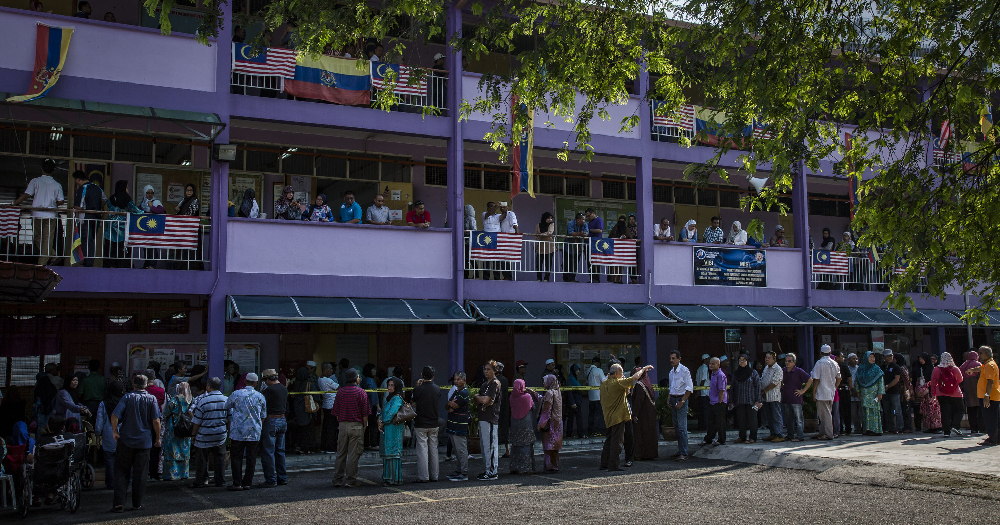Follow us on Telegram for the latest updates: https://t.me/mothershipsg
Malaysia holds its elections on Saturday Nov. 19.
GE15 will be the first Malaysian election with the lowered voting age of 18 or older, introducing a wave of new voters whose issues and concerns will dominate Malaysian politics for the foreseeable future.
Mothership spoke to Tharma Pillai, advocacy director for UNDI 18, an NGO that has advocated for the lowering of the voting age since 2016, about how the voting age came to be lowered, its policy and electoral impact; and the priorities of Malaysia’s youth voters.
40 per cent of the electorate have not been able to vote before
According to Malaysia’s Sun newspaper, GE15 will see 6.1 million new voters, out of an electorate of 21 million.
It is possible to draw a direct line between this fact and the seminal 2018 election, which saw the first transition of power between political coalitions in Malaysian history.
The Barisan Nasional, who had in one form or another held power since Malaysia’s independence, was removed.
The opposition Pakatan Harapan coalition took their place for the next two years, before being ousted due to internal rifts, allowing BN to return to power.
First as the junior partner to Muhyiddin Yassin’s Bersatu party; then eventually as the main coalition partner in Ismail Sabri Yaakob’s government from 2021 onwards.
There has been some contention as to what the achievements of that election was. In essence, what was the point?
To that end, the lowering of the voting age is one achievement that can be traced back to the 2018 election. Remarkable because while it was a PH government that introduced and passed the law, its implementation was under a BN-led government.
The new law has already begun to alter the political landscape, affecting what policy is introduced, such as during the October 2022 budget; as well as the type of candidates are nominated for GE15.
But for it to have a true lasting impact, millions of Malaysian youth will have to actually show up as the polls, something that many see as a real obstacle, as the youth voters are generally characterised as apathetic.
Unanimous support
The initial introduction and passing of the constitutional amendment to lower the voting age was passed by a unanimous vote in the Dewan Rakyat, or lower house of parliament in 2019.
Tharma said that for Undi18, it felt fundamentally unfair an 18 year old, liable for the burdens of adulthood like criminal liability, taxes, or eligibility for military service, was not able to take responsibility for the direction of the country.
He did mention that the group was slightly concerned around the time of the Sheraton Move in 2020, when Malaysian politicians ousted the PH government.
However, Tharma pointed out the law had already been passed and gazetted by then. All that remained was for the law to be implemented, and when asked, the new government repeatedly confirmed that it was on track to be implemented by July 2021, as previously agreed.
Sudden obstacle
But in March 2021, as reported by MalaysiaKini, this suddenly changed.
The government, which was still under Muhyiddin Yassin, who had been part of the initial PH government that introduced, passed and gazetted the law, now said that its implementation would be delayed until September 2022.
Citing difficulties associated with the Covid pandemic, the electoral commission now said that there was too much to be done before July 2021.
The Undi18 law also came with Automatic Voter Registration (AVR), and now the EC was claiming that the difficulty of AVR would cause a delay of over 15 months.
Tharma’s Undi18 organisation refused to accept this, and instead launched two court cases, one in Kuala Lumpur, and one in Kuching, in Sarawak, fronted by a symbolic 18 youths.
Tharma claimed that the EC and the government’s decision seemed like it “reeked” of government interference, as neither had any justification for the delay. And without a proper justification, there was no way to ensure that the delay would not keep compounding into the future.
By September 2021, according to Malay Mail, the Kuching high court ordered the government, now under Ismail Sabri Yaakob, to complete implementation of the law by December 2021.
With the government not appealing, Undi18 had succeeded, ensuring that 18 year olds could vote in GE15.
Mass movement
Tharma was appreciative of the role the court played. But he also notes the organising effort made to raise the ire of the general public.
“We had our own campaign to make sure that there was a mass public movement, and a mass public outcry against the decision to postpone the bill," he said.
Tharma attributes those who supported the campaign as changing the political calculus for the government, and the result means that the voter rolls will increase by nearly 40 per cent for GE15. For reference, the number of eligible voters in 2018 was just under 15 million.
AVR also means that these voters are now easily able to vote. We’ll explore what this means in terms of political considerations for parties in GE15.
Related Stories
Top image by Ulet Ifansasti/Getty Images
If you like what you read, follow us on Facebook, Instagram, Twitter and Telegram to get the latest updates.
